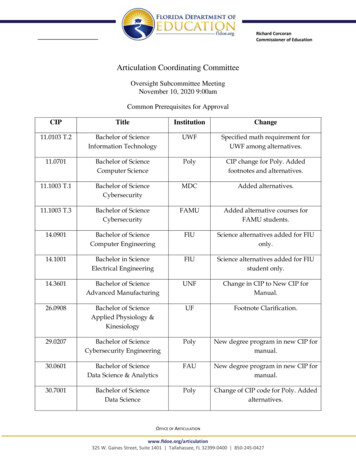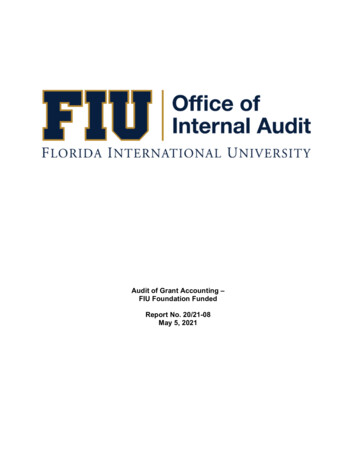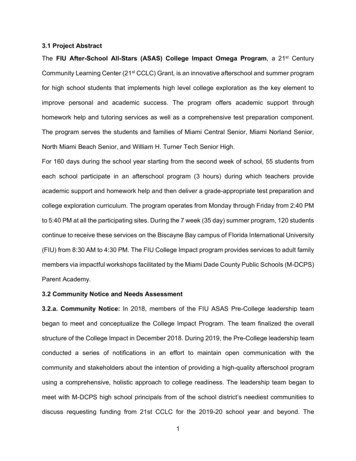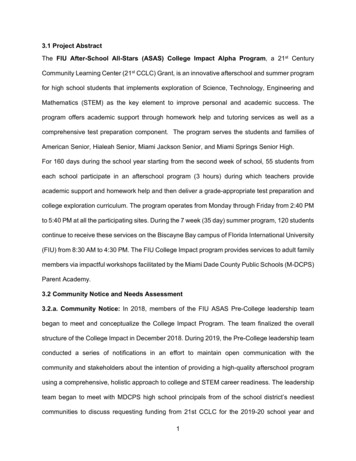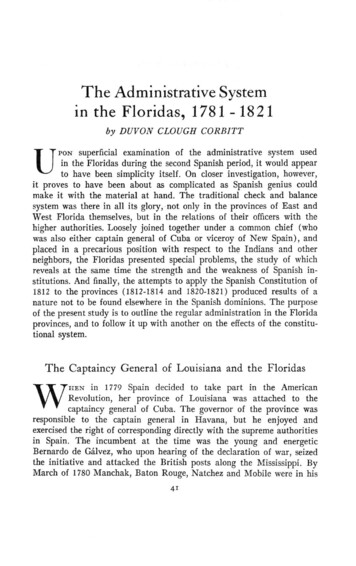
Transcription
The Administrative Systemin the Floridas, 1781- 1821by DUVON CLOUGH CORBITTUPONsuperficial examination of the administrative system usedin the Floridas during the second Spanish period, it would appearto have been simplicity itself. On closer investigation, however,it proves to have been about as complicated as Spanish genius couldmake it with the material at hand. The traditional check and balancesystem was there in all its glory, not only in the provinces of East andWest Florida themselves, but in the relations of their officers with thehigher authorities. Loosely joined together under a common chief (whowas also either captain general of Cuba or viceroy of New Spain), andplaced in a precarious position with respect to the Indians and otherneighbors, the Floridas presented special problems, the study of whichreveals at the same time the strength and the weakness of Spanish institutions. And finally, the attempts to apply the Spanish Constitution of1812 to the provinces (1812-1814 and 1820-1821) produced results of anature not to be found elsewhere in the Spanish dominions. The purposeof the present study is to outline the regular administration in the Floridaprovinces, and to follow it up with another on the effects of the constitutional system.The Captaincy General of Louisiana and the FloridasWHENin 1779Spain decided to take part in the AmericanRevolution, her province of Louisiana was attached to thecaptaincy general of Cuba. The governor of the province wasresponsible to the captain general in Havana, but he enjoyed andexercised the right of corresponding directly with the supreme authoritiesin Spain. The incumbent at the time was the young and energeticBernardo de Gilvez, who upon hearing of the declaration of war, seizedthe initiative and attacked the British posts along the Mississippi. ByMarch of 1780 Manchak, Baton Rouge, Natchez and Mobile were in his41
42TEQUESTAhands, and preparations were under way for an attack on Pensacola.He was rewarded for his activity by an appointment to govern Louisianaand the newly-conquered territory with complete independence from thecaptain general of Cuba, and since Pensacola was expected to be inpossession of the Spaniards soon, its district was added to the newjurisdiction. The appointment, dated February 12, 1781, reads:The King, having considered the great extent acquired by the Province of Louisianathrough the conquests that you have made of the English Forts and Settlements on theMississippi and at Mobile, and having in mind the decorum with which you should betreated as Commander-in-Chief of the Army of Operations at Havana5 has been pleasedto decree that, for the present, and while you govern Mobile and Louisiana, theiradministration shall be independent of the Captaincy General of the Island of Cuba,and that Pensacola and its district shall be added to your jurisdiction as soon as theyare occupied by the forces of the King, who fully authorizes you to govern and defendthem through Substitutes during your absence.'Galvez's first step in his new capacity was to inform Colonel PedroPiernas, his subordinate in New Orleans, of the change. Although nothingwas said about the creation of a captaincy general, colonial officialsassumed that such was the intention,2 and later events proved that theyhad judged correctly. The term was officially adopted a few years later(in 1784) when East Florida was added to the new jurisdiction.East Florida, however, seems to have been first organized as a separateadministrative unit, from the tenor of the royal order appointing VicenteManuel de Z6spedes to take over its government from the Britishauthorities. The order conferred on Zespedesthe Government and captaincy general of the City of St. Augustine and the Provinciasde Florida, with an Annual Salary of four thousand pesos (for the present) payable3from the Royal Treasury, and the Rank of Brigadier in the Royal Armies.Athough in the copy of the order in the Archivo Nacional de Cuba theword Provincias appears in the plural, it seems likely that only EastFlorida was intended. This is indicated by the fact that Zespedes nevertried to assume jurisdiction over anything farther west than the St.Marks region. What was intended by the term "captaincy general" isuncertain. It is possible that the home authorities planned to set up agovernment in East Florida equal in rank to that in Louisiana and WestFlorida, but it is more likely that the term was used to indicate that1. Archivo Nacional de Cuba (hereinafter cited1. The copy here is one sent to Pedro Piernas2. Mir6 to Galvez, April 9, 1792, ibid., legajo3. A copy of the order, dated October 31, 1783,as A.N.C.), Floridas, legajo 2, no.on August 18, 1781.3, no. 7.is in ibid., legajo 10, no. 6.
DUVON CLOUGH CORBITT43Z6spedes was the commander of all troops in the territory. Later governors were occasionally referred to by that title. On the other hand, theterm "captaincy general" may have been used carelessly by the personswho drafted the order. Numerous examples of such carelessness might becited from Spanish colonial documents. 4If a new captaincy general was intended, a change of heart was soonwrought in the Peninsular authorities, for Bernardo de Galvez was givenjurisdiction over a captaincy general consisting of Louisiana and bothFloridas.5 At the time he was also made captain general of Cuba andgiven the promise of the viceroyalty of New Spain when it should becomevacant. According to the historian Pezuela, this promise was given becauseBernardo's father, Matias de GAlvez, then viceroy was in very bad health.When the ship bearing Bernardo to Cuba touched at Puerto Rico, theyoung captain general learned of his father's death. The three monthsthat he spent in Cuba, beginning February 4, 1785, was only a period ofpreparation for the transfer to New Spain, much to the disappointmentof the Cubans who had been looking forward to his administration oftheir island. 6Louisiana and the Floridas seem to have been considered in Spain asa monopoly of Bernardo de Gilvaz, for, although another captain general was appointed to Cuba, they continued under his command untilhis death on November 30, 1786. The personal factor is clearly indicatedby the disposition of those provinces after his decease, when a royalcddula transferred the captaincy general of Louisiana and the Floridasfrom the viceroy of New Spain to Jose de Ezpeleta who was then governing Cuba. The cidula enumerated the following reasons for the change:(1) the "particular merit, services, activities, and military ability" ofEzpeleta; (2) his "zeal and love" for the royal service; (3) the factthat he was "the only Executive Officer who could give the assistance,and speedy succor needed by Louisiana and the Floridas." 7 A fourthreason might have been given: the difficulty of communication betweenthose provinces and Spain by way of Mexico City.4. The results of a recent study of the use of the term "capitania general" in connection with Cuba have not been entirely satisfactory. See D. C. Corbitt, TheColonial Government of Cuba (Manuscript Ph.D. thesis in the library of theUniversity of North Carolina).5. Jacobo de la Pezuela, Historia de la Ida de Cuba (4 vols.; Madrid: 1869-1878),III, 199.6. Ibid., III, 199-200. Pezuela, Diccionario de la Isla de Cuba (4 vols.; Madrid:1863), II, 382-383.7. A.N.C., Floridas, legajo 10, no. 9. The c6dula is dated March 3, 1787.
44TEQUESTAIn order to prevent exasperating delays, GAlvez had found it necessaryto authorize his subordinates in New Orleans, Pensacola and St. Augustineto communicate directly with Spain, simply sending him duplicates oftheir correspondence. This privilege allowed to his subordinates was notnew in Spanish administration: It had been more or less an unwrittenlaw of the Spanish government to learn about colonial affairs from morethan one source. There was not an officer of importance in the coloniesbut had an associate or a subordinate who exercised the privilege ofwriting directly to the home government. GAlvez himself, while governorof Louisiana, had been very active in the enjoyment of this right.Between 1777 and 1781 he had sent 462 letters to the Minister of theIndies and only 304 to his immediate superior, the captain general ofCuba. Those to the captain general were often duplicates or summariesof those sent to Spain, but a careful perusal of the correspondence showsthat much was written home which the captain general did not hearabout. Even if Galvez had forbidden his subordinates in Louisiana andthe Floridas this right, it is very likely that the Spanish governmentwould have overruled his orders. 8The experience of Ezpeleta amounts to almost positive proof of thisassertion. His appointment as captain general of Louisiana and theFloridas removed any necessity for direct communication between thoseprovinces and Spain, since mail between them had necessarily to passthrough Havana. Realizing this fact, and desiring naturally to increasehis control of the new jurisdiction, Ezpeleta ordered the practice stoppedon the ground that it was no longer necessary. 9 His attitude was logical,but the home government wanted as many checks on its colonial officersas possible and his order was countermanded.The wisdom of combining the government of Louisiana and the Floridaswith that of Cuba was questioned by Governor Estevan Mir6 of Louisianain a letter to the ministry of January 11, 1787. He believed that hehimself should have been given the office of captain general, but theministry thought otherwise. The decision was made for administrativereasons and not because of any lack of confidence in Mir6's ability, as isdemonstrated by the fact that upon the retirement of Intendant MartinNavarro of Louisiana early the next year the duties of the latter were8. See the letterbooks of Bernardo de Galvez, ibid., legajo 15, nos. 77 and 79.9. Ezpeleta to Vald6s, December 6, 1787, A.G.I., Papeles de Cuba, 86-6-16 (transcript in the McClung Collection, Lawson McGhee Library, Knoxville, Tennessee).A translation appears in the East Tennessee Historical Society's Publications, No.12 (1940), pp. 116-117. See also A.N.C., Floridas, legajo 3, no. 7 and legajo 10,no. 6.
DUVON CLOUGH CORBITT45given to the governor along with the corresponding increase in salary. 10A few years later Mir6's successor, the Baron de Carondelet, developeda similar ambition to be captain general. In this he had the support ofhis brother-in-law, Captain General Luis de las Casas of Cuba, and thatof Diego de Gardoqui, then Secretary of Treasury. In 1795 the kingauthorized his minister Godoy to erect Louisiana and the Floridas intoa comandancia whenever he saw fit to do so and the next year Las Casasauthorized Carondelet to act as comandante general interino. He filledthis position from December, 1796 to August, 1797, when the continentalprovinces were returned to their former status. In 1801 Captain GeneralSomeruelos of Cuba recommended a separate government for them,but the cession of Louisiana to France was then pending and nothingwas done about the suggestion."What appears to have been the last attempt to separate the Floridasfrom dependence on the captain general in Havana was made in 1807.Governor Vicente Folch of West Florida suggested the appointment ofsuch an officer in the Florida provinces and went so far as to nominatehimself for the position, alleging his long experience on that frontier.The home authorities, however, had other opinions on the subject andFolch's proposal was passed up.' 2The loss of Louisiana to Spain reduced the captaincy general to Eastand West Florida, but Spain managed to keep a hold on the territory asfar west as the Mississippi until the revolution of 1811 in West Florida,at which time the Perdido River became the de facto boundary, thoughthe Spaniards in the province continued to claim the Mississippi boundary for some time to come.' 3The captaincy general of the Floridas was temporarily destroyed bythe application of the Spanish Constitution of 1812. By that famousdocument all chiefs of provinces were transformed into jefes superiorespoliticos, and an attempt was made to separate political from militaryfunctions. If the Florida provinces had contained sixty thousand inhabitants each they would have been entitled to a jefe superior politico ineach of their capitals, but together they could muster scarcely a sixth ofthat number. Therefore, East and West Florida were attached to the10. Ibid., Reales Ordenes, VIII, pp. 523-524.11. A. P. Whitaker, The Mississippi Question, 1795-1803 (New York and Boston:1934), p. 29. See also chapter II, note 3.12. I. J. Cox, The West Florida Controversy, 1798-1813 (Baltimore, 1918), pp. 214215. Folch's letter to Godoy on the subject was dated August 8, 1807, ibid.p. 215, note 41.13. A.N.C., Floridas, legajo 13, no. 8.
46TEQUESTAprovince of Havana as mere districts (partidos) and their respectivegovernors became simple jefes politicos, a term used to designate subordinate officers representing the jefes superiores in important cities. Thiswas in 1812. The next year, when the Diputacidn Provincialof Havana 14met to decide on the permanent status of the Floridas, it was voted tofurther reduce them to mere parishes of the partido attached to the cityof Havana because they did not have the five thousand persons necessaryto be rated as districts. This change was to take effect in 1815 but theFloridas escaped this additional humiliation because Ferdinand VIIreturned to the throne of Spain and abolished the Constitution, withwhose abrogation they rose again to the status of provinces, and togethermade up the captaincy general of the Floridas. The jefe superior politicoin Havana became captain general and the jefes politicos in Pensacolaand St. Augustine resumed their governorships. It should be mentioned,however, that custom was strong, and the constitutional period so short,that the time-honored titles were used even in many official documentseven when the Constitution was in effect. Such combinations as "capitdngeneral jefe superior politico" and "gobernador militar y jefe politico,"were in frequent use at the time and indicate the confusion that reigned.The restored regime lasted until the 1820 revolution in Spain reinstatedthe Constitution. This automatically abolished the captaincy general andreduced the Florida provinces once more to districts, or partidos of theCuban province of Havana. The question of further reducing them toparishes because of insufficient population was again suggested, but beforeit was acted upon orders came to hand over the Floridas to the UnitedStates.' 5Complications in the business of administering the captaincy generalof the Floridas were due to a number of circumstances. In the first placeit was not self-supporting and depended upon a situado, or subsidy fromNew Spain to make up the annual deficit. Since Cuba depended on asimilar subsidy, the captain general in Havana could not supply thedeficiency in the Floridas from his island jurisdiction. Any naval forcesused, except a few galleys and gunboats built for river and coastwiseservice, were under the command of the comandante general del apostadero of Havana, who was the commander of the Spanish West Indies14. Each province had an advisory and legislative body called a diputaci6n provincial.It is proposed to treat this body in more detail in the study of the effects of theConstitution on the Floridas.15.A.N.C., Gobierno Superior Civil, legajo 861, no. 29160. Diario del GobiernoConstitucional de la Habana, December 6, 1820.
DUVON CLOUGH CORBITT47Fleet. Some of the naval commanders were very jealous of their positions,and consequently were often at cross purposes with the captains general.' 6The right of the governors to correspond directly with the homegovernment has been mentioned. In judicial matters there was always thepossibility of an appeal to the audiencia in Puerto Principe (nowCamagiiey), Cuba. Still more troublesome were the handling of Indianaffairs and the relations of the Florida officials with the intendant inHavana, topics that have been reserved for separate treatment.The Intendancy of Louisiana and West FloridaTdisasters of the Seven Years' War led Spain to make a numberof changes in her colonial system, including the introduction ofintendancies into America. The creation of the Cuban intendancyin 1764 led the way. Louisiana followed in 1780 with the appointmentof Martin Navarro as indendant on February 24. As Spanish dominionwas extended over West Florida, Navarro's jurisdiction extended untilall the province came under his financial supervision by 1781.In Cuba the indendant was an officer equal in rank to the captaingeneral, and independent of him. In New Spain, on the other hand, theviceroy with the title of superintendent was in charge of the financialadministration. The Louisiana plan was a kind of compromise betweenthose of Cuba and New Spain. The governor there controlled land grantsuntil 1798. He was also responsible for Indian affairs,' but was obligedto consult the intendant in cases involving finance, such as duties on thefur trade, permits for commerce with foreign countries to secure Indiangoods, and licenses for the use of foreign ships to haul these goods aswell as the furs. It was necessary to spend thousands of dollars each yearto keep the friendship of the Indians, and this called for the joint actionof the governor and the intendant also.2HE16. Pezuela, Historia de la Isla de Cuba, III, 115-119. Jos6 Maria Zamora, Bibliotecade la legislacidn espaiola (Madrid: 1844-1849), III, 334-345. See Corbitt. TheColonial Government of Cuba, chapter II. From 1812 to 1816 the captain generalwas also the naval commander. This was probably due to the fact that the incumbent, Juan Rufz de Apodaca, had been a naval officer.1. A. P. Whitaker, The Mississippi Question, 1795-1803, p. 30 and chapter II, note 6.2. See the correspondence of Mir6, Navarro, McGillivray and Panton in GeorgiaHistorical Quarterly, XXI, No. 1 (March, 1937). pp. 72-83. For similar documents see D. C. and Roberta Corbitt (eds.), "Papers Relating to Tennessee andthe Old Southwest, 1783-1800," East Tennessee Historical Society's Publicationsfor the years 1937 to 1941.
48TEQUESTAUpon the promulgation of the Ordenanza de intendentes for New Spainin 1786, the Louisiana intendant was instructed to follow it in so far aswas practicable, with the reservation, however, that of the four causasmentioned therein -justicia, policia, hacienda y guerra -only two,hacienda y guerra, were to come under his jurisdiction, justice and policebeing especially charged to the care of the governor.3 There were manymatters calling for the joint action of the two officers; yet, they seem tohave cooperated without much friction. For example, the comment byMir6 on his relations with Navarro on the question of a change ofIndian policy: "It is my plan, to which the intendant, with whom Ialways proceed in accord in Indian affairs, agrees . . .4. Professor Whit-aker's careful study revealed the same kind of co6peration during theadministration of Francisco Rend6n (1794-1796).5 Not until the appointment of a man with a contentious turn did the harmonious relationsbetween governor and intendant cease, i.e., Juan Ventura Morales, ofwhom more later.Such cordial relations may have resulted from the instructions sentto the first intendant, Martin Navarro, putting him in subordination tothe governor. 6 It is remarkable, however, that this was done because afew days previous to the signing of the instruction an order to the captaingeneral of Cuba concerning his relations with the intendant in Havanastated that the king desired to havetreated with decorum an officer like the intendente de ejercito y real hacienda, who isso important to His Majesty that in him is vested the collection, preservation, anddisbursement of all branches of the revenue, with complete independence of you; and. . . who is a jeft principal, without other superior than the Superintendente General7de Real Hacienda de Indias.Navarro retired from the Louisiana intendancy in 1788, at which timeGovernor Mir6 Was invested with the powers of the office.8 The inclusionof the phrase, "for the present," in Mir6's commission as intendant sug3. Instructions of June 7, 1799 to Ram6n L6pez de Angulo, A.N.C., Floridas, legajo16, no. 126. The Ordenanza de intendentes appears in Zamora, Biblioteca delegislacidn ultramarina,III, 371-388.4. Mir6 to Sonora, June 1, 1787, East Tennessee Historical Society's Publications,No. 11 (1939), pp. 77-78.5. Whitaker, op. cit., p. 31.6. Ibid., Chapter II, note 6.7. W. W. Pierson, "Establishment and Early Functioning of the Intendencia ofCuba," James Sprunt Historical Studies, XIX, No. 3, p. 93. Carlos de Sedano yCruzat, Cuba desde z850o d 873 (Madrid: 1873), p. 60.8. A copy of Mir6's commission is in A.N.C., Reales Ordenes, VIII, pp. 523-524.
DUVONCLOUGHCORBITT49gests that the union of the offices was looked on as temporary; nevertheless, it was continued until well into the term of Mir6's successor, theBaron de Carondelet. In 1793 there was appointed another intendant,Francisco Rend6n, who reached his post early the next year. 9 Accordingto Professor Whitaker. this move was made in order to insure the operation of the new commercial system promulgated the year before. 10 Nofurther combination of the offices of governor and intendant occurreduntil long after Louisiana had passed from Spanish control.The last occupant of the intendancy in New Orleans was Juan VenturaMorales, who achieved lasting fame by his action in closing the Americandeposit at New Orleans; in fact, he might be called the last of theLouisiana-Florida intendants for, with the exception of an occasionalsuspension from office after he went to Pensacola, he held the positionuntil its abolition in 1817. Morales became acting intendant of Louisianaand West Florida in 1796 on the retirement of Rend6n. Ram6n L6pezde Angulo, a full-fledged intendant, succeeded him in 1800, but wassummarily removed the next year upon his violation of the laws bymarrying a New Orleans girl named Marie Delphine Macarty." Moralesagain became provisional intendant and held office until the Spanishcolors were struck in 1803. As a matter of fact, he remained in Louisianathree years longer, refusing to leave until expelled by the Americanauthorities.For some time after the lowering of the flag Morales and the otherSpanish officials in New Orleans were at a loss what to do because nodefinite orders were sent to govern their conduct. But Morales stayedlong after such orders came. He may have hoped for another diplomaticshake-up which would return Louisiana to Spain. Doubtless, he did notrelish the idea of living at the frontier post of Pensacola after his tasteof more attractive life in New Orleans. Furthermore, in Pensacola hewould drop to the level of Governor Vicente Folch y Juan who, assubdelegado of the intendancy, had long been his subordinate. Moreover,these two officers had developed an antipathy for each other that approximated hatred, and matters did not mend after the Americans took overLouisiana. Morales continued to give orders from New Orleans as9. Gardoqui to the intendant of Cuba (Pablo Valiente), October 30, 1793, ibid.,Floridas, legajo 14, no. 48. Whitaker, op. cit., chapter II, note 7.10. Ibid., note 7. Professor Whitaker cited a memorandum by Gardoqui dated May25, 1793.11. Whitaker, op. cit., p. 161 gives an account of the L6pez y Angulo affair. A copyof the order removing him from office is in A.N.C., Reales Ordenes, XV, p. 59.
50TEQUESTAthough Folch were still his subordinate, to the confusion of the commandant at Mobile and others. Contradictory orders were issued abouttrade through that port with the American territory up the river. 12 Theclimax to the situation was reached in January, 1806, when GovernorC. C. Claibourne peremptorily ordered Morales to leave Louisiana, andFolch flatly refused to allow him to land at Pensacola, forcing him toleave the port with his goods and papers, and to disembark at Mobile."Naturally Morales protested to Spain and he was ordered to proceed atonce to Pensacola and assume the authority of intendant of the province.Both he and Folch were admonished to "try to preserve the best of harmony, and to avoid disputes and contentions.""But Morales willed it otherwise. Even before this admonition reachedhim he was accusing Folch of making innovations in the financial administration of West Florida and proceeded to take matters into his ownhands as far as the western part of the province was concerned, issuingorders to the officers commanding the troops on the Pascagoula River.The officers appealed to Folch, who informed the intendant that onlythe commandant at Mobile had such a right. Mutual recriminations followed until the latter appealed to Spain. The king commanded alldocuments concerning the quarrel to be forwarded to him for examination, 15 and in the meantime Morales was off on another tack with Folch.Before Morales' arrival in Pensacola the finances of West Florida hadbeen administered by the traditional oficiales reales in the form of anaccountant and a treasurer, supervised by the governor as subdelegadoof the intendancy in New Orleans. In addition to the oficiales there wereclerks, warehousemen, porters, etc., many of whom were also officers orsoldiers of the garrison. 16 With the transfer of the seat of the intendancyto Pensacola in 1806, the number of clerks and minor employees in thefinancial department increased, and there was added an asesor, or legaladviser.This appointment is interesting because the first asesor was JoseFrancisco Heredia, the father of the famous Cuban poet, Jose MariaHeredia. Thus it came about that the poet lived in Pensacola betweenthe ages of three and seven, his favorite sister, Ignacia, being born therein 1808. Of more importance to the present study is the fact that Jos612.13.14.15.16.Cox, op. cit., pp. 148-182.A.N.C., Floridas, legajo 18, no. 48.Ibid., legajo 14, no. 48. The orders from Spain were dated March 31, 1806.Ibid., legajo 2, no. 24.Ibid., legajo 17, no. 242 and legajo 18, no. 87.
DUVON CLOUGH CORBITT51Francisco received his appointment from the intendant of Cuba, who,upon reporting the move to Spain for royal approval, was curtly informedthat he had exceeded his authority; Morales' assistant should have beenappointed by the captain general.' 7 Heredia remained in Pensacola asasesor to the intendant, however, until 1810, at a salary of one thousandpesos assigned him by the Cuban intendant. 18 Thereafter the auditor deguerra, or legal adviser to the governor, acted as asesor to the intendantof West Florida. 19The appointment of Heredia illustrates the confusion as to the supervision of the intendancy in Pensacola. Both the Cuban intendant andMorales contended that the right should belong to the former instead ofto the captain general in Havana. The reprimand that followed failed tosettle the matter, and before long the two Havana authorities were atswords points about Florida finances as well as their respective positionsin Cuba itself. 20 The situation became acute during the administrationof Captain General Juan Ruiz de Apodaca (1812-1816), who claimedabsolute control over West Florida finances under an instruction ofJanuary 26, 1782 to Bernardo de Gilvez as captain general, in which thelatter was referred to as the superintendente de real hacienda de laLuisiana y de la Florida Occidental. A bitter dispute lasted until thearrival in Cuba of two more pacific personalities-Captain General Jos6Cienfuegos and Intendant Alejandro Ramirez. On August 9, 1816exactly forty days later-the argument that had promoted hard feelingsfor a generation was settled.Cienfuegos and Ramirez adopted the simple expedient of giving honorto whom honor was due, and in so doing each obtained the full coiperationof the other. The question of finances in the Floridas was settled byCienfuegos's turning the whole matter over to Ramirez until the king'swill on the point should be ascertained-a logical move since both Cubaand the Floridas were dependent on a subsidy from New Spain whichwas usually sent to Havana for distribution. Royal approval of theCienfuegos-Ramirez agreement was given on September 3, 1817, Ramirez17. Two copies of the order, dated May 7, 1806, are in ibid., legajo 18, no. 50.18. For data on the residence of the poet and his father in Pensacola see Jos6 MariaHeredia, Poesias completas (Emilio Roig de Leuchsenring, editor; Havana: 19401942), I, 19.19. A.N.C., Floridas, legajo 18, no. 149.20. The argument was not definitely settled until 1854 when the two positions wereunited. Joaquin Rodriguez San Pedro, Legislacidn ultramarina(16 vols.; Madrid:1865-1869), I, 75. See D. C. Corbitt, The Colonial Government of Cuba, chapter II for an account of the attempts to settle the trouble.
52TEQUESTAbeing made superintendente of the Floridas as well as of Cuba. 21The foregoing imbroglio over the superintendencia was scarcely terminated when the intendancy of West Florida was abolished. Morales,who in 1810 achieved his heart's desire by becoming a full-fledged intendant (hitherto he had been only provisional), was promoted to theintendancy of Puerto Rico and became in a sense the successor toRamirez. Unlike Ramirez, however, who was promoted to Cuba for hisbrilliant work in Puerto Rico, Morales was relieved in 1819 and droppedout of the colonial administration.The last years of Morales in Pensacola deserve a parting comment.Rare were the epochs when he was not the center of a storm. On oneoccasion he was suspended from office on account of his failure to reportproperly the results of a hurricane on October 11 and a fire on October24, 1810, which destroyed many records. 22 Perhaps the dispute in 1812over who should be his substitute can be laid to contagion. The a
administration shall be independent of the Captaincy General of the Island of Cuba, and that Pensacola and its district shall be added to your jurisdiction as soon as they . Bernardo's father, Matias de GAlvez, then viceroy was in very bad health. When the ship bearing Bernardo to Cuba touched at Puerto Rico, the young captain general learned .



